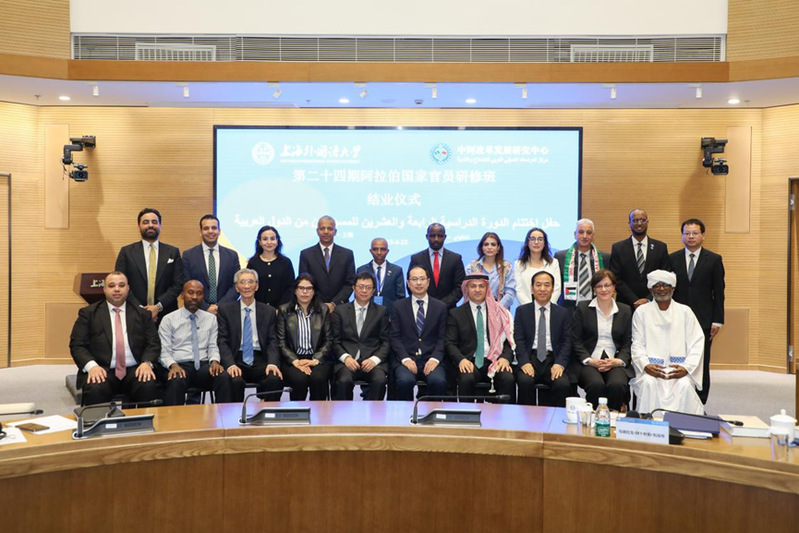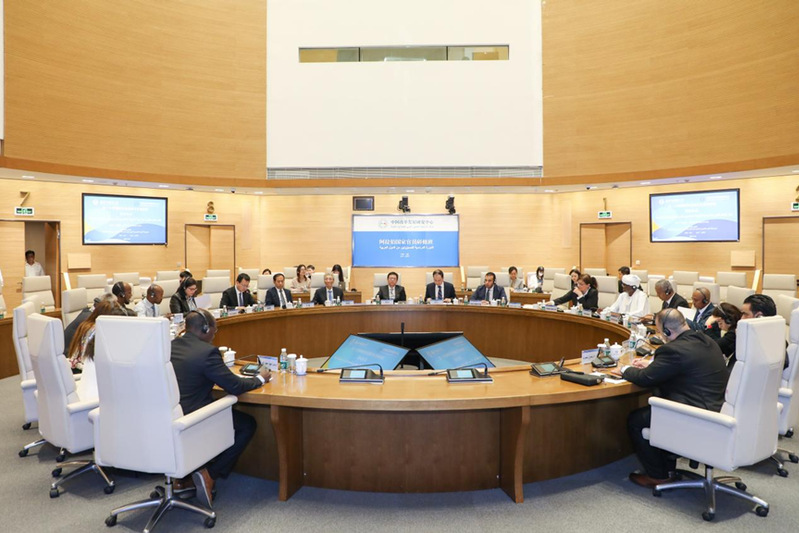On the morning of April 23, 24h Arab Officials Seminar, hosted by China-Arab Research Center on Reform and Development (CARC), successfully concluded in Shanghai. The graduation ceremony was attended by Jian Fangning, Deputy Director-General of the Department of West Asian and North African Affairs of the Ministry of Foreign Affairs of China, and Li Yansong, Executive Director of CARC and President of Shanghai International Studies University (SISU).

The ceremony was hosted by Chen Xiaoli, Secretary of the Party Branch of the Middle East Studies Center at SISU. Representatives from the Ministry of Foreign Affairs, CARC, and the Institute of Middle Eastern Studies at SISU were also present.
President Li Yansong delivered a speech at the ceremony, congratulating the Arab participants on completing the ten-day training program. He noted that next year will mark two significant milestones in China-Arab relations: the 70th anniversary of diplomatic ties and the second China-Arab States Summit. As CARC has now successfully hosted 24 sessions of this seminar, it will continue to expand its scale and strengthen its role as a bridge for China-Arab exchanges and cooperation. Li also highlighted SISU’s distinctive “multilingual+” talent development model and warmly welcomed Arab youth to share what they have seen, heard, and experienced in China with their communities back home, thus contributing to the deepening of China-Arab friendship.
Mr. Ballekacem Ali, First Secretary of the Department of Communication and ICT Development under the League of Arab States’ Economic Affairs Division, spoke on behalf of the participants. He emphasized that this session’s focus on economic development allowed participants to witness the dynamism of Chinese-style modernization and to deeply appreciate China’s strong commitment to supporting Arab development. He reaffirmed the League’s continued support for China-Arab cooperation and expressed a willingness to work together in building a more prosperous and stable future for both peoples.
Following the speeches, CARC awarded graduation certificates to the participants, presented commemorative books, and took group photos to mark the occasion.
During the Listening and Dialogue session, CARC Council Member Zhu Weilie and Director of the Institute of Middle Eastern Studies Ding Jun engaged in in-depth exchanges with the Arab officials. Zhu noted the strategic significance of the Arab world in terms of geography, history, civilization, energy, and trade, stressing its crucial voice in global affairs. Ding highlighted that China’s position in the Middle East differs fundamentally from that of Western countries, as it consistently upholds peace and development. He expressed China’s willingness to work side by side with the Arab world in building a community with a shared future for humanity and promoting win-win cooperation. The Arab participants also shared their views on the future of China-Arab relations, China’s modernization experience, and cooperation among Global South countries.
In his concluding remarks, Jian Fangning noted the slow pace of global economic recovery and the rising instability and uncertainty worldwide. He criticized the U.S.’s arbitrary imposition of tariffs, which harms the legitimate interests of countries including China and Arab nations. He stressed that as staunch supporters of economic globalization and free trade, China and the Arab states hold important positions in the global economic landscape. With the upcoming second China-Arab States Summit as a key opportunity, both sides should deepen solidarity and cooperation and work together to elevate the China-Arab community with a shared future to a higher level. Jian emphasized that this training session marks a new beginning and expressed hope for continued joint efforts to enhance and upgrade China-Arab cooperation.
The successful conclusion of the 24th Arab Officials Seminar provided Arab officials with an invaluable opportunity to gain a deeper understanding of China and served as an important platform for dialogue and collaboration. Looking ahead, China and Arab countries will work together with stronger confidence and closer cooperation to implement the “Five Cooperation Frameworks,” jointly advance modernization, and seize historical opportunities. These efforts will further elevate China-Arab relations and contribute to global peace and development.

